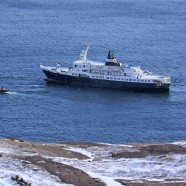Lyubov Orlova, the ghost ship
Lyubov Orlova. IMO 7391434. Passenger ship. Length 100 m, 2,695 t. Cook Islands flag since 2009. Classification society Russian Maritime Register of Shipping. Built in 1976 in Kraljevica (Croatia) by Titovo. Detained in 2002 in Saint Petersburg (Russia). Former Soviet passenger ship owned by Far Eastern Shipping Company (Fesco) from Vladivostok ; acquired in 1986 by the Lubov Orlova Shipping Company, Malta based with Russian capital. This vessel with a capacity of 122 passengers was finally chartered by Cruise North Expeditions, an Inuit company which assigned her on their summer cruises in the Northern Canada. (Hudson and Baffin Bay …). As a result of salaries not paid to her 51 crew members and debts to her bunker suppliers she was seized on September 25th, 2010 in St John (Newfoundland, Canada). She was replaced by her sister-ship the Bahamian Clipper Adventurer (ex-Anna Tarasova) managed by International Shipping Partners, Miami. On August 27th, 2010, the Clipper Adventurer ran aground on a reef in the region of Nunavut, threatening the Canadian Arctic Ocean (Cf. “A new contaminated site in the Arctic”). The Lyubov Orlova was sold as is for an unknown destination of demolition. US $ 275 per ton.
A Cargo Ship on the Beach
In referring to Article R 304-11 of the Code of Maritime Ports (1), the Port Authority of the port of Lorient – Morbihan – could have proceeded with the postponement of the departure of the TK Bremen. In effect, this 30 year-old ship had reached the age of demolition. She presented numerous deficiencies. The absence of panels on the entire hold, as was demonstrated before by aerial photos – might be one more of them. The ship had been recently detained in a Russian port and its Turkish ship owner, proprietor of two older ships, did not immediately furnish all of the guarantees of reliability. The profile of the TK Bremen was such that those responsible for the security and of the traffic of the port of Lorient should have, in view of the imminent dangers about to confront them in a dangerous maritime environment rich in marine life, banned its departure.
A Cargo Ship on the Beach
In referring to Article R 304-11 of the Code of Maritime Ports (1), the Port Authority of the port of Lorient – Morbihan – could have proceeded with the postponement of the departure of the TK Bremen. In effect, this 30 year-old ship had reached the age of demolition. She presented numerous deficiencies. The absence of panels on the entire hold, as was demonstrated before by aerial photos – might be one more of them. The ship had been recently detained in a Russian port and its Turkish ship owner, proprietor of two older ships, did not immediately furnish all of the guarantees of reliability. The profile of the TK Bremen was such that those responsible for the security and of the traffic of the port of Lorient should have, in view of the imminent dangers about to confront them in a dangerous maritime environment rich in marine life, banned its departure.
Oil slick Queen demolished in Bangladesh ?
According to informations coming from Chittagong, three container ships managed by German companies have just been put on sale on the demolition market. These three vessels are the joint property of KGAL, based in Germany, the largest European maritime leasing* company, and subsidiary of Allianz and Dresdner Bank, and of V Ships Germany, subsidiary of V Ships Monaco, the largest manager of commerce vessels in the world.
The Ankara, the Maersk Brisbane, and the Maersk Barcelona (Maersk is solely the charterer) were built in Germany in 1975-1976 and are motorized by vapor turbines whose installation requires large quantities of asbestos. These three sisterships have a lightweight of 15,000 t each.
Already, V Ships and KGAL have made it known that they will assign the container ships destined for demolition to the highest bidder, that is to say to Bangladeshi demolition shipyards, at around $700 per ton while the average price in India is around $550 per ton.
Considering social, sanitary, and disastrous environmental conditions in Bangladesh, Robin des Bois asks these European companies to either proceed with the preliminary removal of asbestos, to choose the best Asian demolition shipyards within the framework of a specific partnership, or even to demolish and recycle these vessels in Europe. A letter was sent to them in this respect.
The three container ships are frequently in European waters and one of them, the Maersk Barcelona, appeared on the Atlantic front in September 2005, near the island of Sein, off Brittany, by a record “61 km (38 miles) oil slick” that was sanctioned by an $800,000 fine. The inspectors from the vessel security center had revealed a lack of care for the oily waters treatment installation.









